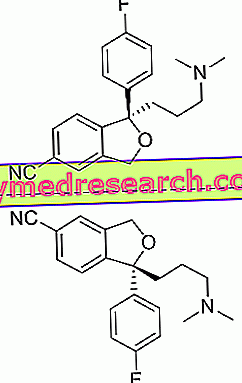Bicalutamide is a synthetic non-steroidal anti-androgen drug. Its use has been promoted since 1995 for the treatment of advanced prostate cancer in a combination therapy to surgical castration.

Bicalutamide - Chemical Structure
When castration is not possible, therapy can be performed in combination with other antiandrogen drugs (such as gonadotropin-releasing factor-like drugs, or LHRH). Bicalutamide, however, can also be used as monotherapy.
Indications
For what it uses
The use of bicalutamide is indicated for the treatment of the following diseases:
- Advanced prostate cancer;
- Non-metastatic prostate cancer;
- Other androgen-dependent pathologies.
Warnings
Treatment with bicalutamide should be carried out under the strict supervision of a doctor who specializes in the administration of anticancer drugs.
Because bicalutamide is primarily metabolised in the liver, caution should be exercised when administering the drug to patients with pre-existing severe liver disease, in order to avoid drug accumulation that could be harmful. It is, however, necessary to constantly monitor liver function for the duration of the therapy.
Much attention must also be paid to the administration of bicalutamide in patients with pre-existing renal dysfunction.
Due to the possible occurrence of cardiac side effects - during bicalutamide therapy in cardiac patients - continuous monitoring of cardiac function is recommended.
Bicalutamide should not be used in women, adolescents and children.
Interactions
A reduction in glucose tolerance has been observed in patients treated in combination therapy with bicalutamide and LHRH analogues . This phenomenon can lead to diabetes or loss of glycemic control in patients with pre-existing diabetes.
Bicalutamide is able to inhibit some of the liver enzymes responsible for the metabolism of antihistamine drugs - such as terfenadine and astemizole - and of prokinetic drugs, such as cisapride . The reduced metabolism of these drugs can cause them to accumulate and produce toxic effects. Therefore, concomitant administration of this type of medication and bicalutamide should be avoided.
Attention should be paid to the simultaneous administration of bicalutamide and drugs such as cimetidine (a drug used to treat gastric ulcer) and ketoconazole (an antifungal). These drugs, in fact, are able to reduce the metabolism of bicalutamide, causing it to accumulate in the body with a consequent increase in its toxicity.
Furthermore, bicalutamide can interfere with drugs such as:
- Oral anticoagulants, for example warfarin ;
- Ciclosporina, an immunosuppressive drug used in the prevention of rejection in transplants;
- Drugs acting on calcium channel blockers, these drugs are used in the treatment of hypertension.
You should tell your doctor if you are taking other medicines, including over-the-counter medications, herbal and / or homeopathic products.
Side effects
Bicalutamide can induce various side effects. The type and intensity of adverse effects that can occur varies from individual to individual. In fact, there is great variability in the response to chemotherapy between one patient and another.
The following are some of the major side effects that may occur following drug therapy.
Breast pain and swelling
In some patients, treatment with bicalutamide causes breast swelling which is painful to the touch. In the event of this effect, it is necessary to inform the doctor that - if he deems it necessary - he will be able to prescribe drug treatment.
Hepatobiliary disorders
Treatment with bicalutamide may impair liver function; this impairment is manifested by the yellowing of the skin and the white part of the eyes ( jaundice ).
Allergic reactions
Bicalutamide can trigger allergic reactions in sensitive individuals. These reactions usually occur with localized swelling of the face, lips, throat and / or tongue and consequent difficulty in speaking and breathing, or with severe itching and swelling of the skin.
Respiratory disorders
Bicalutamide therapy can cause serious respiratory disorders. Severe wheezing may occur, followed by cough and fever . Cases of interstitial lung disease have also been reported, in some cases, with a fatal outcome.
Nausea and vomit
Treatment with bicalutamide may induce nausea and vomiting. Usually, these symptoms appear in mild form and can be easily kept under control by the use of anti-emetic (antivomit) drugs.
Decreased sexual desire and impotence
Bicalutamide can lead to a decrease in sexual desire and can have negative effects on the ability to get an erection. In general, these side effects are temporary and sexual function normalizes some time after the end of therapy.
Anemia
Therapy with bicalutamide can cause anemia, therefore, it can cause a reduction in blood hemoglobin levels. The main symptoms of anemia are pallor, fatigue and weakness .
Diabetes mellitus
Treatment with bicalutamide - especially if it is given in combination with analogous LHRH drugs - can promote the onset of diabetes. Blood glucose levels should therefore be kept constantly under control.
Cardiac disorders
Bicalutamide can cause serious heart conditions such as heart failure and myocardial infarction, with even fatal results.
Skin disorders
Treatment with bicalutamide can cause skin rashes - similar to acne - associated with itching. In this case, it would be good to use neutral detergents and - if the doctor considers it necessary - antihistamine drugs can be used. Furthermore, bicalutamide can cause skin dryness .
Infertility
Bicalutamide therapy may cause temporary impairment of fertility or infertility in humans.
Other side effects
Other side effects that may occur during bicalutamide therapy are:
- dizziness;
- General malaise;
- Abdominal and / or thoracic pain;
- Presence of blood in the urine (hematuria);
- Constipation;
- Edema;
- Decrease or loss of appetite;
- Depression;
- Drowsiness;
- Diarrhea;
- Flatulence;
- Sweating;
- Weight increase;
- Shortness of breath.
Overdose
There is no antidote for bicalutamide overdose. If you have taken - or suspect you have taken - an overdose of medication, you should contact your doctor or the nearest hospital immediately.
Action mechanism
Cancer cells constituting many forms of prostate cancer need testosterone (an androgen hormone) to survive. Testosterone binds to specific proteins - the androgen receptors (or ARs) - which are found on the membrane of cancer cells. Once testosterone is bound to its receptor, a cascade of chemical signals begins which produces a certain biological response.
Bicalutamide is able to bind to the androgen receptor (AR) instead of testosterone, thus preventing it from carrying out its activity. In this way, the growth and inhibition of tumor cells is inhibited.
Mode of Use - Posology
Bicalutamide is available for oral administration. It is found in the form of film-coated tablets. The tablets should be taken whole with a glass of water once a day.
The dosage of bicalutamide must be established by the oncologist according to the type of tumor to be treated and according to the patient's condition. The usual drug doses are listed below.
Monotherapy
The usual dose of bicalutamide alone is three tablets - containing 50 mg of active ingredient - to be taken once a day. Treatment with bicalutamide can last for years.
Association therapy
When bicalutamide is given in combination with analogous LHRH drugs, the usual dose of the drug is one tablet - containing 50 mg of active ingredient - to be taken once a day. Bicalutamide therapy should be started at least three days before the start of treatment with the LHRH analogue.
Furthermore, bicalutamide can also be administered in combination with radiation therapy.
If you forget to take a tablet, you should definitely not double the next dose to make up for the forgetfulness, but you must notify your oncologist immediately.
In patients with severe renal dysfunction, a dose adjustment of the drug may be necessary.
If the patient to be treated suffers from mild hepatic dysfunction, a dosage adjustment should not be necessary.
Pregnancy and breastfeeding
Bicalutamide should not be used in women and in any case should not be used during pregnancy and lactation.
Contraindications
The use of bicalutamide is contraindicated in the following cases:
- Known hypersensitivity to bicalutamide;
- In women;
- In adolescents and children;
- If you are taking drugs such as terfenadine, astemizole or cisapride (see "Interaction with other drugs" section).



